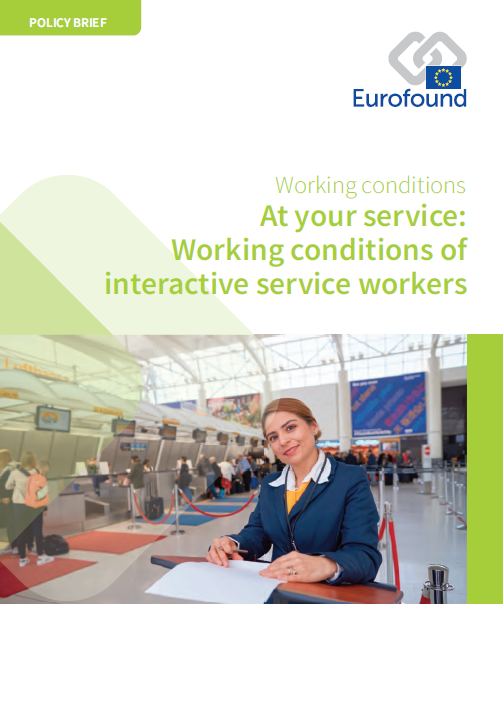
Etwa drei Viertel der Erwerbsbevölkerung in der EU sind im Dienstleistungssektor beschäftigt und ein erheblicher Anteil der Beschäftigten in diesem Sektor interagiert direkt mit den Empfängern der von ihnen erbrachten Dienstleistungen, wie Kunden, Patienten oder Schüler. Dies kann eine anspruchsvolle Aufgabe darstellen, da an diese Arbeitnehmer üblicherweise emotionale Anforderungen gestellt werden und sich diese auf ihr Wohlbefinden auswirken können.
Im vorliegenden Kurzbericht werden die Arbeitsbedingungen von Menschen analysiert, die im Bereich interaktive Dienstleistungen tätig sind, und es wird ihre Arbeitsplatzqualität im Vergleich zu durchschnittlichen Arbeitnehmern untersucht. Der Schwerpunkt liegt auf den zahlreichen emotionalen Anforderungen, die an sie gestellt werden, wobei bewertet wird, in welchem Umfang spezifische Ressourcen am Arbeitsplatz (wie soziale Unterstützung oder eine hohe Führungsqualität) dazu beitragen können, negative Auswirkungen solcher Anforderungen zu verhindern. Angesichts der COVID-19-Pandemie wird besonderes Augenmerk auf die Untergruppe der Beschäftigten im Gesundheitswesen gelegt.
Key findings
Overall, 41% of EU employees work in direct contact with clients, customers, users, patients or other service recipients. One-fifth of these are health workers on the frontline of the COVID-19 pandemic.
Interactive service work is female-dominated: 61% are women. The subgroup of frontline health workers is even more gender-imbalanced, comprising 85% women.
Compared to other workers, interactive service workers (ISWs) have more challenges with respect to working time – atypical hours, inflexible time arrangements and longer hours. They also have higher work intensity – meaning, for instance, that they have tight deadlines and their pace of work is more often determined by the demands of clients and customers. Their social environment is poorer, too, attributable in part to their contact with clients and customers, which exposes them to more adverse social behaviour.
The data show that 22% of all ISWs and 32% of frontline health ISWs are exposed to high emotional demands – such as having to hide their feelings – compared to 14% of EU employees overall.
Job resources mitigate the negative consequences of emotional labour. High-quality management, for instance, is associated with better well-being.
Tables
- Table 1: Main occupations of ISWs, EU27 and the UK, 2015
- Table 2: Occupational breakdown of ISWs by gender, EU27 and the UK, 2015
- Table 3: Working life outcomes by type of employee, EU27 and the UK, 2015
Graphs
- Figure 1: Occupational classification of ISWs and non-ISWs (%), EU27 and the UK, 2015
- Figure 2: Distribution of ISWs by income quintiles (%), EU27 and the UK, 2015
- Figure 3: Job quality of ISWs and non-ISWs compared across seven dimensions
- Figure 4: Job quality of off-site and on-site ISWs compared across seven dimensions
- Figure 5: Job quality profiles of male and female ISWs compared across seven dimensions
- Figure 6: Emotional demands on ISWs and extent of those demands (%), EU27 and the UK, 2015
- Figure 7: Experience of high emotional demands (%), by type of employee, EU27 and the UK, 2015
- Figure 8: Prevalence of emotional demands in the most exposed occupations (%), EU27 and the UK, 2015
- Figure 9: Effect of work on health (%), by ISW category, EU and the UK, 2015
- Figure 10: Impact of social support on health outcomes of ISWs with high emotional demands (%), EU27 and the UK, 2015
- Figure 11: Impact of autonomy on health outcomes of ISWs with high emotional demands (%), EU27 and UK
- Figure 12: Impact of management quality on health outcomes of ISWs with high emotional demands (%), EU27 and the UK
- Number of pages
-
28
- Reference nº
-
EF20016
- ISBN
-
978-92-897-2097-7
- Catalogue nº
-
J-AR-20-004-DE-N
- DOI
-
10.2806/850024
- Permalink
Cite this publication
Eurofound (2020), At your service: Working conditions of interactive service workers, European Working Conditions Survey 2015 series, Publications Office of the European Union, Luxembourg.
